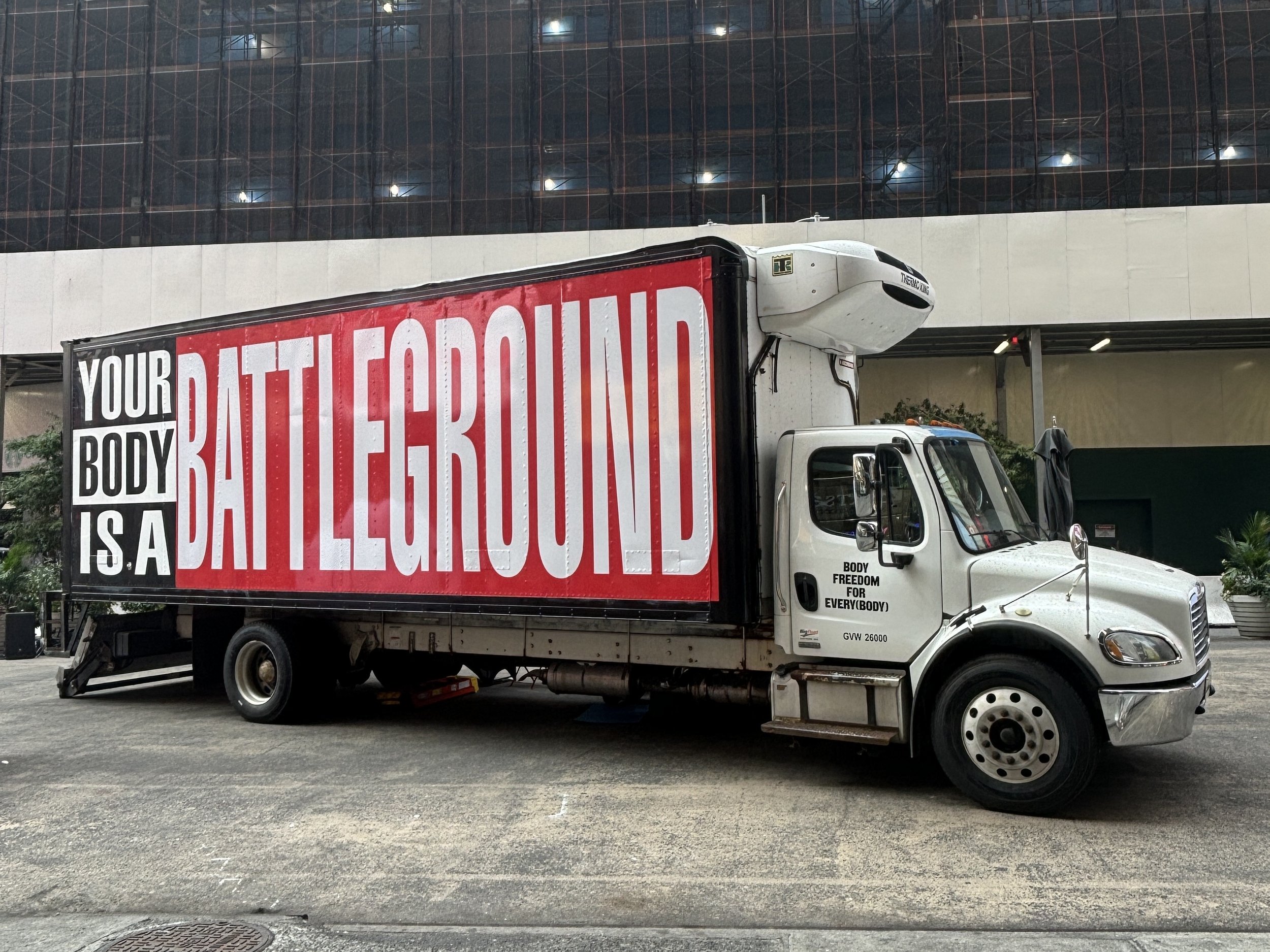
This fall, a 27-foot-long box truck emblazoned with the phrase “your body is a battleground” in Barbara Kruger’s signature red, white, and black will crisscross the country, full of art related to bodily autonomy—the themes are reproductive justice, queer liberation, and trans joy.
The three-month-long mobile exhibition, titled “Body Freedom for Every(Body)” kicked off in Times Square on Wednesday as an official event for the Armory Show, organized by Newark art nonprofit Project for Empty Space in partnership with Times Square Arts.
It features a rotating selection of work by over 100 artists—mostly reproductions, for insurance reasons. But the list of participants is impressive. Kruger, who did an anti-graffiti vinyl wrap for the truck’s exterior, is joined by the likes of Marilyn Minter, Dread Scott, Ana Mendieta, Laurie Simmons, Andrea Bowers, Chitra Ganesh, Ryan McGinley, Shahzia Sikander, and Helina Metaferia.
“Body Freedom for Every(Body)” was inspired by the Project for Empty Space’s three-part 2019/20 show “Abortion Is Normal,” which was meant to be a safe space to acknowledge that while abortion can be difficult and upsetting, it is also a fact of life.
Project for Empty Space co-directors Jasmine Wahi and Rebecca Jampol with the “Body Freedom for Every(Body)” mobile exhibition. Photo by Carlos Hernandez.
But Project for Empty Space co-directors Jasmine Wahi and Rebecca Pauline Jampol realized that New York and Newark were already relatively safe spaces. In many cities and towns across the country, abortion rights are increasingly restricted, if not banned outright, especially in the wake of the Supreme Court’s overturning of Roe vs. Wade.
“We were thinking about how wonderful it would be if we could take this kind of work on the road, and go to places where people might not have this immediate access to community and supportive networks,” Jampol told me.
That’s where the idea of a truck came in. It’s an ambitious endeavor, especially considering Project for Empty Space is on the eve of opening its new home in the Ironside neighborhood of Newark next month. But Jampol and Wahi are never ones to back down from a challenge.
“We always have a number of crazy ideas backlogged,” Jampol said. This one became a reality when the duo unexpectedly received the gift of a truck from an anonymous donor. Suddenly, it was time to plan a tour.
The opening of the “Body Freedom for Every(Body)” mobile exhibition in Times Square. Photo by Carlos Hernandez.
Project for Empty Space enlisted Sam Giarratani, head of Negative Space, which helps artists with large-scale public art projects, as the project manager. Artist Ann Lewis agreed to come on board as the tour manager, traveling to each stop with the truck.
“This is basically the issue I’ve been fighting in my practice for the last eight years,” Lewis, who quit an adjunct professor job teaching graphic design to join the tour, told me. “How do you discuss bodily autonomy with people who don’t have the same viewpoint that I do? I want to help humanize the issue.”
Gabrielle Simmons, vice president of She Trucking and a seven-year veteran of the industry who runs her own trucking company, agreed to get behind the wheel for the cross-country drive.
“I absolutely love art, so to be able to drive an art gallery on wheels is absolutely amazing,” Simmons told me. “And I love the mission!”
Work on view in the “Body Freedom for Every(Body)” mobile exhibition in Times Square. Photo by Carlos Hernandez.
Because the truck was formerly used by art handlers, it’s well equipped for art storage and transportation. And Wahi and Jampol have curated 35 configurations for a rotating gallery wall with built-in frames that can change each day. There is a cozy reading lounge up front, for more intimate discussions.
There will also be a digital gallery showcasing the entire collection, available online, and an ongoing exhibition of works included in the show at Project for Empty Space’s Chinatown location.
A small selection of works will be featured at each stop along the way. That includes a trio of chrome-plated Aimee Koran sculptures of items related to motherhood and babies, like a manual breast pump elevated by a shiny red coating.
Marilyn Minter, Untitled, Elder Sex. Photo courtesy of the artist and JBE Books & LGDE.
Outside the truck, Michele Pred is displaying two large-scale inflatable sculptures of the abortion pills mifepristone and misoprostol.
“The most important thing with this body of work is to disseminate information about access to abortion pills,” she told me. “You can still access medication abortion pills in states where abortion is illegal. It’s plancpills.org, and if you can’t afford it they will give it to you.”
Today, you can catch “Body Freedom” downtown at New York University’s Center for Black Visual Culture. Sunday, it will be at AIDS Memorial Park in Greenwich Village, and it will be in Newark on Tuesday. After that, the truck heads to Washington, D.C., the first of nine stops between now and the start of December.
Sam Kirk, Glorious (2019). Courtesy of the artist.
The tour does stop in Los Angeles, but the rest of the journey is to distinctly red states—Iowa, Missouri, Arizona, and two stops each in Texas and Florida. It wraps up in Miami Beach just in time for Art Basel, bookending its journey with arguably the two most important events on the U.S. art fair calendar.
There will be informal “Truck Talks” staged out of the back of the truck, starting on September 10 with ayemi shakur, Newark’s director of arts and cultural affairs; artist Tatyana Fazlalizadeh of the “Stop Telling Women to Smile” campaign; and public policy advocate Quadira Coles, president of the New Jersey Abortion Access Fund.
As a whole, the project hopes to engage people in conversation.
“I think,” Wahi said, “that people will be receptive to it.”